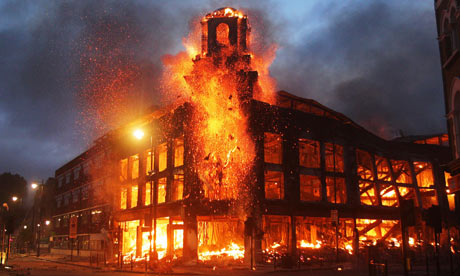 |
| Fire rages in Tottenham, Saturday night (Lewis Whyld/PA) |
The uprisings occur during a long year and several months of public distress at the "austerity" program the coalition Conservative-Liberal Democratic government, headed by Prime Minister David Cameron since May 2010, has continually imposed. The Tory-Liberal Democratic economic approach, which has included government service cutbacks and reduced spending across a range of formerly state-funded projects, as well as hikes in state university tuitions and increased fees for other services, has thus far (and unsurprisingly) failed to reverse the British economy's contraction in the wake of the 2008 economic collapse. The uprisings also come as London's police metropolitan police organization, headquartered at Scotland Yard, is under state investigation and public suspicion as a result of allegations that its officials, including its past leaders, aided and abetted Rupert Murdoch's News International's newspapers, including the now shuttered News of the World, in illegally accessing the personal information, via hacking, wiretapping and other means, of a vast array of Britons, ranging from members of the royal family to a kidnapping victim, and possibly of Americans including the families of those killed during the 9/11 bombings.
The unrest has since continued, with eruptions in other London-area districts such as Enfield, Edmonton, Dalton, Walthamstow, and Brixton, the last of which was the site of three of the most momentous British riots of the late 20th century, in 1981, 1985, and 1995. As today, in 1981, the predominantly Black Caribbean community in Brixton was disproportionately suffering from high unemployment, terrible housing, and an already high crime rate, and a series of confrontations with police culminated in riots confrontations between police and locals, of all races, between April 10-12, 1981. That burned into public consciousness the racial and ethnic and class crises that had long been festering in British society, worsened by the approach of the Conservative Thatcher government, and marked the beginning of a series popular uprisings, often turning on the axes of race and poverty, throughout Britain. One result was a change, after the 1981 Scarman Report, in police search procedures, but only 4 years later, the shooting of Dorothy Groce, a Jamaican immigrant, by police sparked yet another violent uprising, which was followed a week later by the Broadwater Farm riot in Tottenham, after the death of Cynthia Jarrett, an Afro-Caribbean woman, during a police search of her home. And so it goes.
 |
| Tottenham uprisings, Saturday, August 6 (GoogleMaps/Guardian Online) |
It would be an intellectual failure to draw too simple conclusions about the situation in Britain, but it is clear that the government's broader approach to the economy has been a debacle, thus disparately disadvantaging the very people who live in boroughs like Tottenham and Brixton, as well as the working and middle-classes in general; that the axes of race and class profoundly inflect the still-ongoing unequal power relations between the still predominantly white state security forces (and British national and local governments) and many multiracial communities they serve; and that there will be no easy solutions if people, especially those without power or any sense of stake in a society's direction, have few viable channels to express their concerns and see mechanisms to address them. From the reports I've seen, local governmental authorities are taking note of the exploding crises, but the solutions must to be horizontal and vertical, cutting across and deep into every layer of British--and every other--society, and must involve the people who not only feel but have been left out, economically, politically, socially, culturally. These solutions also have to start happening right away, or Tottenham could be just one of many boroughs to catch fire, and more than a few times, before the summer, and the year, are out.









No comments:
Post a Comment